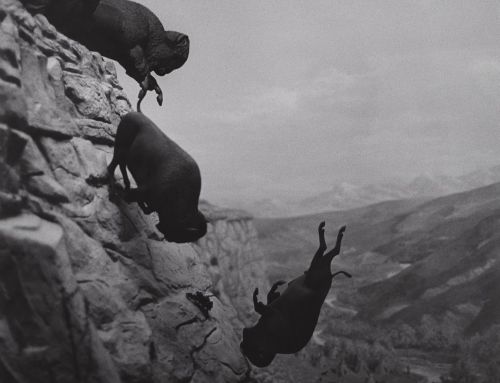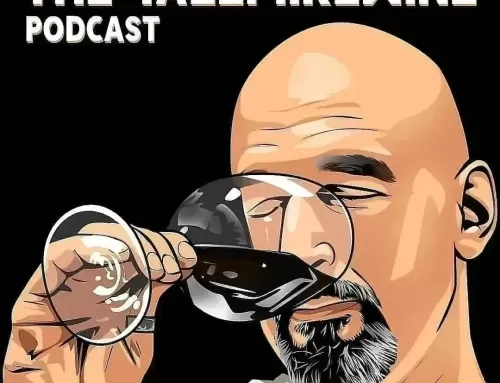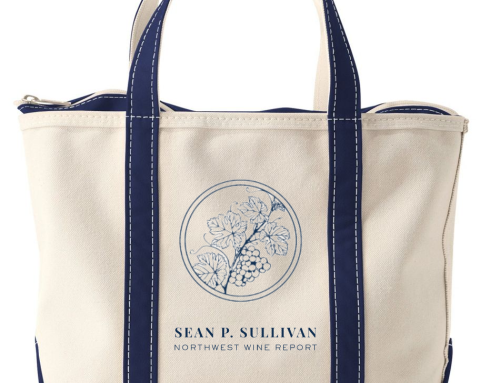
Washington wine has frequently been noted for its affordable prices. However, don’t tell that to folks from BC. NAFTA be damned, British Columbia adds a whopping 100+% tax to all imported wine. The result is eye-popping prices for BC consumers for wine from Washington and other areas.
For example, on a recent trip, a $10 USD bottle of Red Diamond Cabernet Sauvignon was selling for $24 CAD (close to 1:1 conversion at the moment). A $40 bottle of Abeja Cabernet Sauvignon? $87 CAD. Ouch (see a BC Liquor Store Markup Calculator here). How can British Columbian consumers be expected to absorb these exorbitant taxes and buy Washington wine? Answer – they can’t and Washington wine exports to BC are subsequently anemic, especially considering that Vancouver is a large metropolitan city two hours from Seattle. Washington wine sales in BC from July 2009 through June 2010 were estimated at 32,626 cases sold equaling $2,301,393.
It’s not much better for the wine tourist. BC residents traveling to Washington wine country to see what all the fuss is about can’t bring back more than 1.5L of wine (2 bottles) per person without paying customs and province/territory assessments. U.S. residents traveling north are subject to similar restrictions on bringing wine into the country. And don’t bring a bottle back to ship it to your cousin in Saskatchewan. Inter-province shipping of liquor is, of course, illegal. We won’t talk about wine not being allowed to be brought into restaurants.
Sadly, those of us in Washington don’t see a whole lot of British Columbia wine either. Partly this is due to many of the BC wineries being small production shops. Not much of the wine makes it across the border. Additionally, minus the whopping tariffs on imported wine, it’s difficult for some of these wines to compete in the marketplace.
Some of BC’s laws are, obviously, designed to protect local wine sales. Some are also, of course, designed to generate large amounts of revenue for the province. But are these laws good for B.C. wine consumers? Consumers either have to pay exorbitant prices to drink wine from other areas or stick with BC wines. The result is, essentially, narrowing consumer selection. Is it good for BC wineries? Having laws that decrease market competition is not a good path to assuring either high quality or competitive pricing. If some of these wineries look to reach out to international markets they are in for a big surprise.
Bottom line, it’s time for British Columbia to enter the new millenia and make substantial changes to its wine laws. Doing so would be good for consumers, good for wineries, and good, of course, for Washington wine. Free the wine!
Check out the websites below for more information on BC and Canadian wine laws.







Interesting article Sean. Having stuimbled into Okanagan and Similkameen Valley's last Memorial Day weekend, I think there are actually many wines produced there that would actually be bolstered by a more open market for export from CA. Likewise, it is a true shame the citizens of BC cannot enjoy Washington wines without jumping through obsene hoops or paying obsene prices.
Chris, there's a lot of excellent wine being made in BC. It's a true shame we don't see more on the shelves here in Washington and in the US more generally.
My husband and I are BC consumers. We love BC wines. There are some great ones here that the rest of the world knows nothing about. Also love Washington wines and regularly read the Washington Wine Report. If BC wine laws are protecting BC wine, that is a good thing, however, I do not agree with BC wineries not being able to ship between provinces. Allowing that might eliminate the need to protect them, so it does sound like a government $ grab. We definitely have a gripe with not being able to bring a bottle into a restaurant as wine prices in BC restaurants are ridiculous. This keeps us at home with our good bottles of wine more often than not so local restaurants are not benefiting by our patronage. As for bringing US wines into BC, the cost depends on the price of the bottle. True, it can be a 100% markup, but there is an upper limit cost @ $12.75 per 750 ml + 12% tax (www.winelaw.ca). So, for a $15 bottle of wine (or less) it will be 100%, but for a $100 bottle of wine, it is much less, even much less than the markup on the same $100 bottle in a BC liquor store or a BC restaurant. We have figured out that it costs us less to purchase our finer wines across the border, pay the monthly cost to store them in a wine locker in Washington State, travel twice a year to pick them up (must stay minimum 48 hours), and pay the border costs, than it is to buy our finer wines in BC. I know this is probably not the market you are referring to in your blog, but it is currently working well for us as BC consumers trying to get around our antiquated wine laws.
In BC our laws go back to 1928 on the inter province shipping. The duty and taxes to bring a wine home is 135%. A ten dollar US wine become $23 dollars, tempers your buying decisions.
Anon, many thanks for the comment and insights regarding bringing wine back across the border. Very interesting stuff. Would love to see BC remove the restriction on bringing wine into restaurants. I think it makes no sense. It seems such a shame that there isn't a more vibrant exchange between the two areas because both are growing and making some great wines.
Frank, it's amazing how many wine laws in the US and BC date to that era and have existed largely unchanged. The thing about the markup for me is, when I'm paying $23, I expect a $23 wine. When I'm paying $10, I expect a $10 wine. When I pay $23 and it tastes like a $10 wine I'm not happy. No way it can't affect people's purchasing decisions.
We were in Victoria BC a few years ago, and $40 at a restaurant brought us a middling quality wine to the table, one that should cost $10 or less retail. All consumer goods (except food) are taxed heavily, especially "luxury" items (liquor, wine, cigars etc). The Canadians seem to be o.k. with it though. They are accustomed to being taxed for the government services they receive.
Rand, interesting point about people in BC being accustomed to the taxes. Certainly is a shocker to out of towners. Seems to me like there should be rioting in the streets! :)
Sean. The rioting in the streets is happening in places like Wisconsin where for decades the people have expected services from government without paying for them. This sense of entitlement is more acute in the agricultural field where a "cheap food policy" has wreaked havoc on Canadian agriculture. The dumping of US food products has all but destroyed the Canadian farming industry. No one likes taxes or mark ups, but no one likes pot holes in their roads or line ups at emergency.
High alcohol taxes in Canada created an entire industry on the other hand. The Wine "kit" manufacturers are all headquartered just across the boarder n Canada. They buy up boatloads (actually truckloads and truckloads) of WA state juice, haul it back across the boarder, process it, package it and sell it like crazy to all the locals (including many in the States) who turn it into some pretty darn good wine. Its the only way to have an inexpensive bottle of wine in Canada. There are also many FOP or "Ferment on Premise" places that help the novice through the process as well.
I guess this is how they pay for "free" health care.
Sean, thanks for enlightening your readers from south of the boarder as to our woes with the custom issues we must deal with in BC. Many wineries that we visit in WA are shocked when we inform them of our laws.
That being said there tends to be some latitude given when you cross the boarder with more than your allotted 2 bottles per person, after a minimum of 48 hours away from Canada. My wife and I have come across with up to 12 bottles, ready to pay duty, and have been reminded that we are only allowed 2 each and you're free to go. My understanding is this is due to the amount that the Federal government is collecting on this (the Customs Officers are Canadian government employees)which is $0.47 with the bulk being Provincial tax (there is a bit of Federal Tax included in the HST, but not to split hairs here) the Customs Officers seem reluctant to spend their time collecting for the Province. True or not it is perceived as such.
You can get an understanding of how the taxation works by looking Canada Wine Law web page http://www.winelaw.ca/cms/index.php?option=com_content&view=article&id=19:bringing-wine-back-to-canada-after-a-trip&catid=3:shipping-border-import-laws&Itemid=26 . Where pricing changes is once you go over $15 wines. In the case of a $50 wine your duties would be $19.28 which is not too onerous if you are in a position to purchase and enjoy expensive wines. (continued)
(part 2) The BC writer above explains one way to get around this by keeping their expensive wines on the WA side of the boarder, an added cost that unfortunately we all cannot enjoy. You can purchase wines directly through the BCLDB, they are able to source from smaller wineries in WA and CA as long as you meet minimum purchase. If you are purchasing expensive wines this method works well based on the duties as discussed above.
I can agree with Bill Eggert as to dumping of food products and their effects, but this is a game that all countries play to try and get advantage in the world supply of food goods and we certainly have felt the pressures of a much larger neighbour to the South. There certainly has been protection of the BC wine industry and that has helped it to become a healthy entity in this province. Does it continue to need protection? That is a discussion that would take up too much space here, but I am on the no side. There is much work to be done to allow wine to flow freely across provincial boundaries and the wine industry is certainly leading the charge.
Michael is correct in stating that there is an abundance of fruit that comes over the boarder in the form of juice and in some cases fruit on the vine to make wine. As the fruit/juice is a food product it is taxed differently and therefor makes a more affordable bottle of wine. There is some fruit coming from award winning vineyards and under the proper hands the wine is every bit as good as wines made commercially in WA.
I'd like to finish by inviting our friends from WA to come to the Okanagan Valley to taste our wines and enjoy a wonderful playground. The white wines of BC can stand up to any in the world for vibrancy of flavours and balance of acids. The reds can be hit and miss but that is the fun of wine touring, finding things that you like. Oh, and your duty on bring back into WA is only $0.21 per liter with the first liter duty free.
I am the BC writer above. Just wanted to be clear that my income and my husband’s income combined is no greater than the average household income in BC and that the ONLY way we are able to “purchase and enjoy expensive wines” IS by keeping them across the border. Our budget would not allow us to enjoy these same wines in BC. The trick to keeping costs down is to minimize the number of trips per year and maximize the litres of wine brought back each time. The most expensive wines, of course, would be brought back duty free as our 2-bottle allotment each allows.
Anon 3/4, interesting stuff! Thanks for sharing your perspective.
Anon 3/5, fascinating! Thanks.